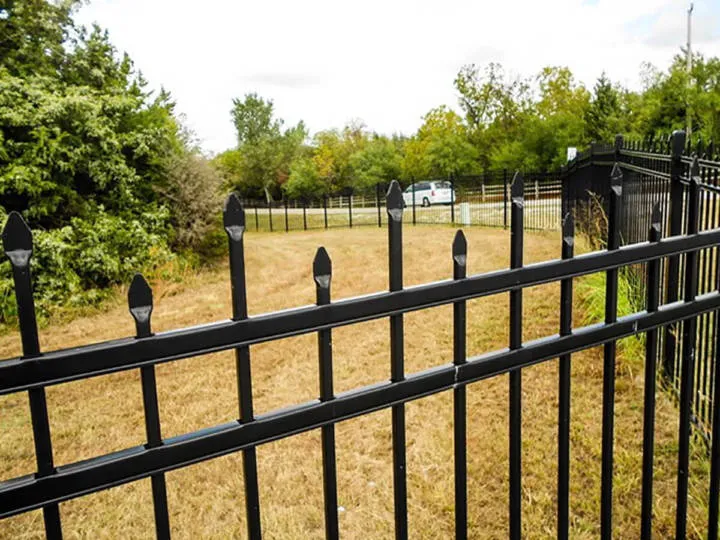Nov . 12, 2024 15:24 Back to list
Maintenance Tips for Metal Fences
Metal fences are prized for their durability and aesthetic appeal, but like any outdoor structure, they require regular maintenance to ensure they remain in top condition. Proper care can extend the lifespan of your fence, enhance its appearance, and prevent costly repairs down the line. This article provides essential maintenance tips to help you keep your metal fence looking great and functioning effectively.

Regular Inspections About Metal Fences
Conducting regular inspections is crucial to maintaining the integrity of your lightweight metal fencing. Aim to inspect your fence at least twice a year, ideally in the spring and fall. During these inspections, look for signs of damage such as rust, dents, or loose components. Pay particular attention to areas where the fence meets the ground, as moisture accumulation can lead to corrosion.
Document any issues you find and address them promptly. Early intervention can prevent small problems from escalating into significant repairs, ultimately saving you time and money.
Cleaning Your Metal Fence
Keeping your metal furring fence clean is essential for both aesthetic reasons and maintenance. Dirt, grime, and environmental pollutants can accumulate on the surface, potentially leading to corrosion over time. A simple cleaning routine can help mitigate these issues.
Use a mixture of mild soap and water to wash your fence, applying it with a soft cloth or sponge. For stubborn stains or areas with significant buildup, a soft-bristle brush can help. Be sure to rinse thoroughly with water to remove any soap residue. For aluminum fences, avoid harsh chemicals or abrasive cleaners, as these can damage the finish.
Rust Prevention About Metal Fences
Rust is one of the most common problems associated with metal fences, especially those made of steel or wrought iron. To prevent rust from forming, apply a protective coating to the fence regularly. This can be a rust-inhibiting paint or a specialized metal sealant designed to provide a barrier against moisture.
If you notice any rust spots during your inspections, address them immediately. Remove rust using a wire brush or sandpaper, and then apply a rust-inhibiting primer followed by a suitable paint. This proactive approach can help maintain the fence's appearance and structural integrity.
Protecting Against Corrosion About Metal Fences
In addition to rust, corrosion can also affect metal fences, particularly in areas with high humidity or coastal climates. To protect against corrosion, ensure proper drainage around the fence to prevent water accumulation at the base. Consider installing gravel or a drainage system to facilitate water flow away from the fence.
Additionally, if your fence is made from iron or steel, applying a protective wax or sealant can create an extra layer of defense against moisture. Regular maintenance of this sort will help prolong the life of your metal fence.
Addressing Loose Components of Metal Fences
Over time, metal fences can develop loose panels or fittings due to weather conditions, ground shifting, or general wear and tear. Regularly check for loose bolts, screws, and hinges during your inspections. Tightening these components as needed will help maintain the stability and security of your fence.
If you discover any broken parts, such as bent panels or detached sections, address these issues promptly. Repairing or replacing damaged components ensures that your fence remains secure and effective in its intended purpose.
Seasonal Considerations About Metal Fences
Seasonal changes can impact the condition of your metal fence, making it important to adjust your maintenance routine accordingly. In winter, snow and ice can cause damage, particularly if they accumulate on the fence. Consider brushing off snow to prevent excess weight from bending or breaking panels.
In spring, inspect for any damage caused by winter weather. Clean off any debris that may have accumulated during the colder months and ensure that the fence is free of mold or mildew. In the fall, prepare your fence for winter by checking for any loose components and applying protective coatings if needed.
Professional Maintenance About Metal Fences
While many maintenance tasks can be handled by homeowners, some situations may require professional attention. If your fence has sustained significant damage or if you're unsure about the best course of action, consulting with a fencing professional can provide clarity. Professionals can assess the condition of your fence, recommend repairs, and perform specialized maintenance tasks that may be beyond the scope of typical DIY efforts.
Additionally, some fencing companies offer maintenance services, allowing you to schedule regular check-ups to ensure your fence remains in peak condition.
Enhancing Aesthetic Appeal With Metal Fences
Maintaining the visual appeal of your metal fence is equally important as ensuring its functionality. Consider applying paint or a protective coating in a color that complements your property. Not only does this improve aesthetics, but it also adds an additional layer of protection against the elements.
Incorporating landscaping elements around your fence can also enhance its appearance. Planting shrubs, flowers, or vines can create a more inviting atmosphere while providing natural protection against harsh weather conditions.
-
Reinforcing Mesh: Core Material of the Construction Industry
NewsJul.07,2025
-
Welded Wire Fabric Reinvented for Modern Projects
NewsJul.04,2025
-
Superiority of Stainless Steel Woven Mesh
NewsJul.04,2025
-
Key Types of Razor Wire and Their Applications
NewsJul.04,2025
-
Durable Metal Fence Types for Security
NewsJul.04,2025
-
Best Materials for Livestock Fence
NewsJul.04,2025
products.







